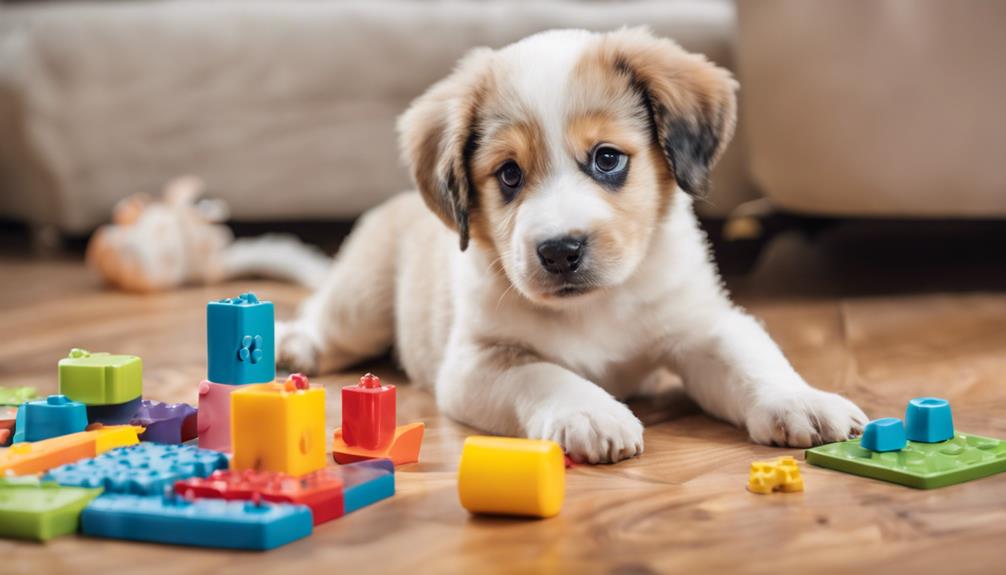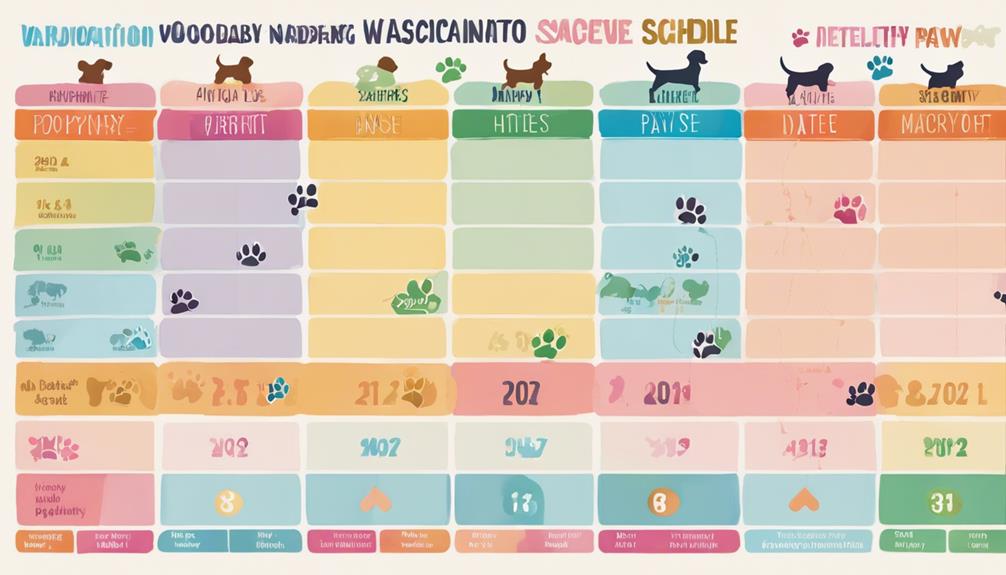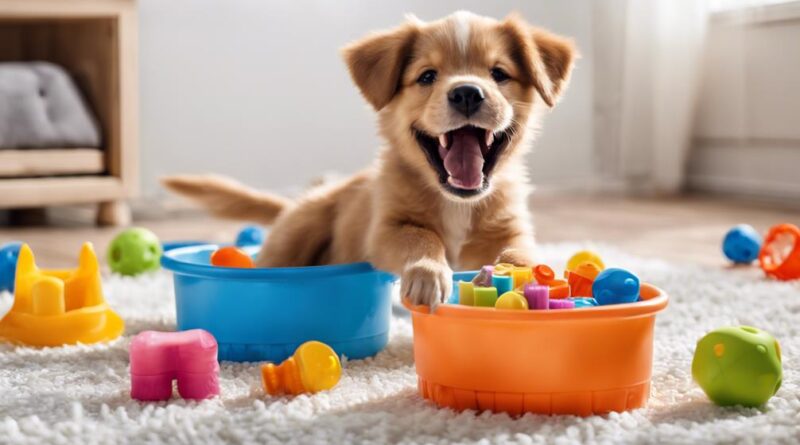12 Essential Tips for Nurturing a Healthy Puppy
To nurture a healthy puppy, focus on balanced nutrition with essential nutrients and portion control. Regular exercise and interactive play are vital for their well-being. Socialize them through classes and playdates for positive development. Prioritize vet check-ups, vaccinations, and dental care. Mental stimulation with toys and games is essential to prevent boredom. Consistent grooming and weight management are crucial. Create a calming sleep routine and monitor behaviors closely. Address training promptly to strengthen your bond. These 12 essential tips lay a strong foundation for your puppy's overall health and happiness.
Proper Nutrition
To ensure your puppy thrives, feed them a balanced diet rich in essential nutrients. Proper nutrition is crucial for your puppy's growth and overall health. When selecting food for your puppy, consider any potential food allergies they may have. Some puppies may be sensitive to certain ingredients, so it's important to choose a diet that suits their individual needs.
In addition to choosing the right food, portion control is key to maintaining a healthy weight for your puppy. Overfeeding can lead to obesity and other health issues, while underfeeding can result in nutritional deficiencies. Follow the feeding guidelines provided on the food packaging, and consult your veterinarian for personalized recommendations based on your puppy's age, breed, and activity level.
While it's tempting to spoil your puppy with treats, it's essential to incorporate them into their diet in moderation. Opt for healthy puppy treats that complement their balanced diet. Treats shouldn't exceed 10% of your puppy's daily caloric intake to prevent weight gain and nutritional imbalances.
Regular Exercise
How can you ensure that your puppy stays healthy and energetic as they grow? Regular exercise is key to keeping your furry friend in top shape. Engaging in playtime fun not only provides an energy release for your puppy but also strengthens the bond between the two of you. Outdoor adventures offer the perfect opportunity for both exercise and bonding time.
When it comes to playtime fun, consider incorporating interactive toys that encourage physical activity. Toys like balls, frisbees, and tug ropes can keep your puppy active and entertained. Additionally, interactive games such as fetch or hide-and-seek can stimulate their mind while keeping them moving.
Outdoor adventures are a great way to break the routine and explore new surroundings with your puppy. Whether it's a hike in the woods, a trip to the beach, or simply a walk around the neighborhood, outdoor activities provide mental stimulation and physical exercise. These outings also offer a chance for your puppy to socialize with other dogs and people, helping them develop important social skills.
Socialization Skills
Developing strong socialization skills in your puppy is crucial for their overall well-being and happiness. Socialization helps your puppy become comfortable with various environments, people, and other animals, setting the foundation for a well-adjusted and confident adult dog. To nurture these skills effectively, consider incorporating playdate etiquette and enrolling your puppy in puppy classes.
Playdates provide excellent opportunities for your puppy to interact with other dogs in a controlled environment. This helps them learn important social cues, such as how to greet other dogs appropriately and engage in play without being too rough. Additionally, puppy classes offer structured settings where your furry friend can learn to focus amidst distractions and follow basic commands. These classes also facilitate positive interactions with other puppies, further enhancing their social skills.
Aside from playdates and classes, outdoor adventures can also aid in your puppy's social development. Taking your puppy to new places exposes them to different sights, sounds, and smells, helping them become more adaptable and confident. Furthermore, allowing your puppy to interact with other well-behaved dogs can foster canine friendships, providing them with companionship and social support.
Training Techniques
Effective training techniques play a crucial role in shaping your puppy's behavior and ensuring a harmonious relationship between you and your furry companion. Positive reinforcement is a highly effective method when training your puppy. This technique involves rewarding good behavior with treats, praise, or toys, encouraging your puppy to repeat the desired actions. By focusing on positive reinforcement, you can build a strong bond with your puppy based on trust and encouragement.
Crate training is another valuable tool for both training and providing a safe space for your puppy. Introducing your puppy to a crate early on can help with house training and prevent destructive behavior when you're not around. Make sure the crate is comfortable and enticing for your puppy, with soft bedding and toys inside. Gradually increase the time your puppy spends in the crate, ensuring it remains a positive experience.
Consistency is key in training your puppy. Establish clear rules and boundaries from the beginning and stick to them. Dogs thrive on routine and will respond well to consistent training methods. Remember to keep training sessions short and enjoyable to prevent your puppy from becoming bored or frustrated.
Vet Check-ups
Regular vet check-ups are essential for maintaining your puppy's health and well-being. These visits play a crucial role in ensuring your furry companion stays healthy throughout their life. During these check-ups, your veterinarian will provide vaccination reminders to keep your puppy up to date on necessary immunizations. It's also a great time to discuss any concerns you may have and ask questions about your puppy's health and behavior.
Maintaining accurate health records is another vital aspect of these vet check-ups. Your vet will keep track of your puppy's growth, vaccinations, and any health issues that may arise. These records help in monitoring your puppy's overall health and provide valuable information for future visits.
In addition to routine check-ups, preventative care is key to keeping your puppy in optimal health. Your vet can advise you on parasite control, nutrition, and other preventive measures to ensure your puppy leads a healthy life. Furthermore, in case of any emergencies or sudden health issues, knowing where your nearest emergency vet clinic is located can be a lifesaver.
Dental Care
Ensuring optimal dental health for your puppy is essential for their overall well-being and longevity. Just like humans, dogs require proper dental care to prevent issues such as gum disease and tooth decay. Here are some essential tips to help you maintain your puppy's oral health:
- Puppy Teething Woes: Puppies go through a teething phase that can be uncomfortable for them. Providing appropriate dental toys can help soothe their sore gums and redirect their chewing behavior away from your furniture or belongings.
- Brushing Routine: Establishing a regular brushing routine is crucial for your puppy's oral health. Use a dog-specific toothbrush and toothpaste to clean their teeth gently. Start slowly, allowing your puppy to get used to the sensation, and gradually increase the frequency of brushing as they become more comfortable.
- Oral Health: Keep an eye out for signs of dental problems such as bad breath, swollen gums, or discolored teeth. If you notice any issues, consult your veterinarian for advice and possible treatment options. Regular dental check-ups are also recommended to ensure your puppy's teeth and gums are in good condition.
Mental Stimulation

Maintaining your puppy's mental stimulation is key to fostering their overall well-being and development. Just like physical exercise, mental challenges are essential for your puppy's growth and happiness. Enriching activities and interactive toys play a crucial role in keeping your puppy's mind sharp and engaged.
Introducing your puppy to puzzle games is a fantastic way to stimulate their cognitive abilities. Puzzle toys that require your puppy to think and problem-solve not only provide mental stimulation but also prevent boredom. These games can range from treat-dispensing toys to interactive puzzles that encourage your puppy to use their problem-solving skills.
Incorporating daily mental challenges into your puppy's routine will help prevent behavioral issues that may arise from lack of stimulation. Simple activities such as hiding treats around the house for your puppy to find or teaching them new tricks can keep their minds active and engaged.
Grooming Routine
Establishing a consistent grooming routine for your puppy is essential to maintain their hygiene and overall health. Regular grooming not only keeps your puppy looking their best but also plays a crucial role in preventing health issues.
Here are some key grooming practices to keep in mind:
- Brushing Techniques: Brushing your puppy regularly helps in removing dirt, preventing matting, and distributing natural oils for healthy skin and coat. Use a brush suitable for your puppy's coat type and brush gently to avoid causing any discomfort.
- Shedding Control: Shedding is a natural process for dogs, but regular brushing can help minimize loose fur around your home. Invest in a quality shedding brush to manage your puppy's shedding effectively.
- Bathing Frequency and Ear Cleaning: The frequency of baths depends on your puppy's breed and lifestyle. Over-bathing can strip their skin of natural oils, so aim for a balance. Additionally, remember to clean your puppy's ears gently to prevent infections. Use a veterinarian-approved ear cleaning solution and avoid inserting anything deep into the ear canal.
Vaccination Schedule

Developing a proper vaccination schedule is crucial for safeguarding your puppy's health and immunity. Early protection through vaccinations is key to preventing various diseases that can be harmful to your furry companion. Puppies have developing immune systems, making them more susceptible to illnesses, which is why following a vaccination schedule is vital.
When your puppy is young, they receive a series of vaccinations to kickstart their immune development. These initial shots help your puppy build immunity against diseases like parvovirus, distemper, and rabies. By ensuring your puppy receives these vaccinations on time, you're providing them with the best chance at a healthy life.
Regular booster shots are also essential to maintain your puppy's immunity throughout their life. These boosters help reinforce the initial vaccinations and ensure that your furry friend remains protected against diseases as they grow older. Consulting with your veterinarian to create a personalized vaccination schedule based on your puppy's lifestyle and risk factors is crucial in providing them with the best protection possible.
Healthy Weight Management
When considering your puppy's overall well-being, ensuring they maintain a healthy weight is fundamental to their long-term health and vitality. Proper weight management is crucial to prevent various health issues and promote a happy, active life for your furry companion.
Here are some essential tips to help you manage your puppy's weight effectively:
- Portion Control: Controlling the amount of food your puppy consumes is key to preventing overeating and excessive weight gain. Consult with your veterinarian to determine the appropriate portion sizes based on your puppy's age, size, and breed.
- Exercise Balance: Regular exercise isn't only essential for keeping your puppy physically fit but also aids in weight management. Engage your puppy in appropriate physical activities that match their energy levels and needs.
- Weight Monitoring, Growth Patterns: Keep a close eye on your puppy's weight and growth patterns. Sudden changes in weight or abnormal growth rates could be indicators of underlying health issues. Regularly weigh your puppy and discuss any concerns with your veterinarian.
Quality Sleep

Quality sleep is paramount for your puppy's overall health and well-being, ensuring they're refreshed and energized for their daily activities. Establishing a bedtime routine can help signal to your puppy that it's time to wind down and get ready for rest. Consistency is key when it comes to bedtime routines, so try to create a calming environment by dimming lights and keeping noise levels low. Providing a comfortable sleep environment is essential for your puppy to have quality rest. Make sure they've a cozy bed or crate with soft bedding where they can feel safe and secure.
Setting a regular sleep schedule for your puppy can aid in regulating their internal clock, promoting better sleep patterns. Puppies generally need more sleep than adult dogs, so incorporating nap times into their daily routine is crucial. Just like human babies, puppies may need multiple naps throughout the day to recharge and support their growth and development.
Monitoring your puppy's sleep behaviors can also give you insight into their overall health. If you notice any sudden changes in their sleep patterns or if they seem restless during the night, it may be worth discussing with your veterinarian to rule out any underlying issues affecting their sleep quality. By prioritizing quality sleep for your puppy, you're helping to ensure they're happy, healthy, and ready to take on each day with enthusiasm.
Monitoring Behaviors
To ensure your puppy's well-being and address any potential health concerns, observing and monitoring their behaviors is key. By paying attention to your puppy's actions and reactions, you can gain valuable insights into their overall health and happiness.
Here are some essential tips for monitoring your puppy's behaviors effectively:
- Behavioral Training: Engaging in behavioral training with your puppy isn't only a fun bonding experience but also crucial for understanding and shaping their behaviors. Consider enrolling your puppy in obedience classes to establish good habits and strengthen your communication with them.
- Behavioral Cues: Recognizing your puppy's behavioral cues is essential for identifying any signs of distress, discomfort, or illness. By understanding their body language and reactions, you can address issues promptly and ensure they receive the care they need.
- Body Language: Your puppy's body language can speak volumes about their emotional state and well-being. Pay attention to their posture, tail wagging, ear position, and facial expressions to gauge how they're feeling. This awareness can help you provide a nurturing and supportive environment for your furry companion.
Monitoring your puppy's behaviors consistently and attentively won't only strengthen your bond but also contribute to their overall health and happiness. By being proactive and observant, you can address any concerns promptly and ensure a positive upbringing for your beloved puppy.
Frequently Asked Questions
How Can I Prevent My Puppy From Chewing on Furniture and Shoes?
To prevent your puppy from chewing on furniture and shoes, use chewing deterrents like bitter sprays.
Train your puppy with redirection techniques, swapping the item for a chew toy, and positively reinforce good behavior with treats or praise.
Consistency is key – supervise your puppy closely and provide plenty of appropriate chew toys.
With patience and persistence, your puppy will learn what's acceptable to chew on.
What Should I Do if My Puppy Is Afraid of Loud Noises?
If your puppy is afraid of loud noises, start desensitization training. Use sound desensitization to help ease their anxiety.
Gradually expose them to noises at a low volume, rewarding calm behavior. Over time, increase the volume slowly. Create positive associations with the sounds by offering treats or playtime.
Consistency and patience are key in helping your puppy overcome noise phobia. Reach out to a professional trainer for additional guidance if needed.
Is It Normal for My Puppy to Eat Grass?
It's common for puppies to eat grass, and it's usually nothing to worry about. Grass consumption can be a normal part of their behavior and may help with their digestive health.
However, keep an eye on how much grass they're eating and monitor for any signs of discomfort or illness. If your puppy seems unwell after eating grass, consult your veterinarian to rule out any underlying issues.
How Do I Teach My Puppy Not to Beg for Food at the Table?
When teaching your puppy not to beg for food at the table, use positive reinforcement and consistent training.
Establish boundaries by creating a designated spot for your pup during mealtime.
Ignore begging behavior and only reward calm behavior with treats.
Encourage good manners by reinforcing the desired behavior with praise and rewards.
With patience and practice, your puppy will learn proper mealtime etiquette and respect your boundaries.
What Are Some Ways to Keep My Puppy Entertained When I'm Not Home?
When you're away, keeping your puppy entertained is key. Interactive toys and puzzle games can provide mental stimulation.
Consider enrolling them in doggy daycare for socialization and fun.
Pet cameras let you check in and even interact remotely.
These options can help prevent boredom and anxiety, ensuring your puppy stays happy and engaged while you're not home.
Conclusion
In conclusion, by following these essential tips for nurturing a healthy puppy, you can ensure that your furry friend grows up to be happy, well-adjusted, and thriving.
Remember to prioritize proper nutrition, regular exercise, socialization, training, and regular vet check-ups to give your puppy the best start in life.
With love, attention, and proactive care, you can set your puppy up for a lifetime of health and happiness.
